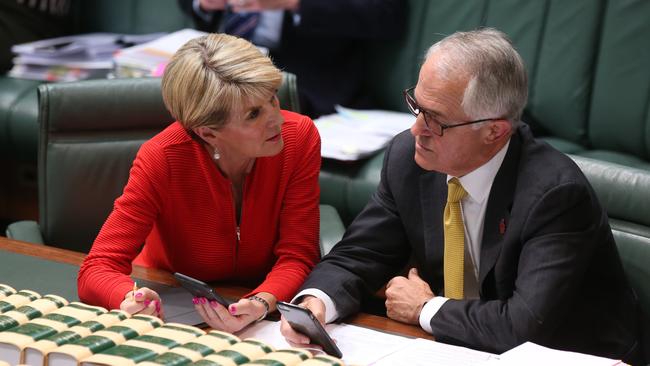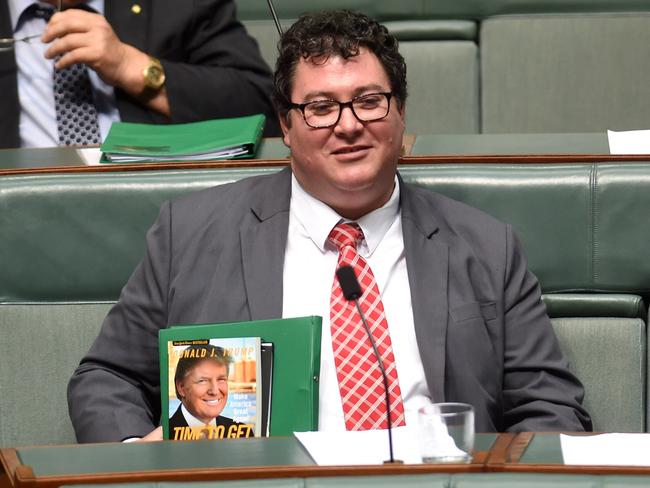An increasingly isolationist American could undermine our protective ring of superpower agreements
IF YOU thought this election had no impact on Aussies, think again. Here’s what life could be like under Donald Trump’s rule.

FOREIGN Minister Julie Bishop showed Prime Minister Malcolm Turnbull her mobile phone during Question Time, confirming news plunging markets were already reacting to.
Donald Trump had been victorious over the Democrats and much of the Republican Party, and had left Hillary Clinton in the Ohio and Michigan rust belt dust.
The man Mr Turnbull had criticised for “loathsome” comments about women, and opposition leader Bill Shorten had called “barking mad”, had won the election that Deputy Prime Minister Barnaby Joyce described as “a really dirty, filthy concoction”.
Mr Trump spoke a lot of rubbish during the campaign, attractive as many voters found him, but there are some commitments he can’t be relied on to be too inexperienced to implement.
And one of the central promises he made was that a Trump administration would pull the shutters down around an isolationist America.
The implications for Australia, a middle-ranked nation reliant on multilateral arrangements to keep in touch with the super powers and to ensure China and the USA keep talking, are substantial.
Mr Trump was sent to the White House by a block of insecure workers — including 50 per cent of union member voters — who believe trade agreements are paid for with their jobs.
Mr Trump agrees with them and has vowed to wreck such arrangements, such as the North American Free Trade Agreement.
That means it is almost certain the proposed Trans Pacific Partnership of 12 nations including Australia will not proceed and the trade dividend Coalition governments have promised will not appear.
This puts a cloud over the US participation in other pacts such as the Asia Pacific Economic Co-operation forum (APEC).
The mood within the RG Casey Building, the HQ of the Department of Foreign Affairs down the hill from Parliament, would have been as severe as the markets.
Mr Trump’s campaign bravado threatened a showdown with China that would pitch Australia into the excruciating gulf between our major global security partner and our biggest trading partner.
This would not enhance chances of resolving tensions over the South China Sea, for example, a problem for us, Japan and South Korea. A Trump administration might decide the USA should abandon our region.
Further, the Trump exploitation of fear of Muslims — not just Islamic extremists — will have an impact on US relations with our biggest and most important near-neighbour, Islamic Indonesia.
Our hopes in the Middle East also are at risk. We must remember we have military men and women there supporting our interests in peaceful settlements, improbable as they might seem at the moment.
Mr Trump has preached a simplistic message of trust in President Bashar al-Assad of Syria to fight and defeat Islamic State, ignoring the Assad regime’s murders of its own people and the strong case against him of dissidents.
As another leader Mr Trump likes, Russia’s Vladimir Putin, has found, bombing IS into the stone age isn’t easy.
Among the allied nations warning that American faith in Assad would be foolish, and could increase the possibility of a bigger war involving Turkey and Iran, is Israel. There is huge trepidation in Tel Aviv over Mr Trump’s grasp of foreign affairs.
Meanwhile, Mr Trump’s Australian surrogates such as Liberal senator Cory Bernardi, One Nation senator Pauline Hanson and the LNP’s George Christensen, will claim his election was an endorsement of their own positions.

This will increase pressure on Mr Turnbull to offer greater appeasement to the agitators in the Coalition base vote, and so increasingly retreat from his better instincts.
Before Mr Trump was declared President-elect, Ms Bishop told Sky News the Australian Government had “reached out” to both Trump and Clinton camps during the campaign to build a rapport with them ahead of the vote.
Any election in the US was “momentous” not just for the states, but for the “rest of the world”, she said.
Ms Bishop said she had been consistently saying “for many months” that Australia would work with anyone the American people elected.
Finally, just across the way from the RG Casey Building in the Treasury Department, calculations will be under way as to the Trump financial shock to Australia and to our trading partners.
The markets have dived in their initial response, wiping billions off global growth, and we cannot be isolated should this be beyond repair.
And there are backroom problems. If President-elect Trump carries out his threat to “drain the swamp” of the Washington establishment governing class will make some of our valuable, long-term contacts and sources disappear.
It could be the vulnerable workers cheering a Trump victory might soon be demanding to know why they weren’t warned.
This American vote, even if Mr Trump is all talk and little delivery, could make the Brexit decision look like a triumph of common sense.



